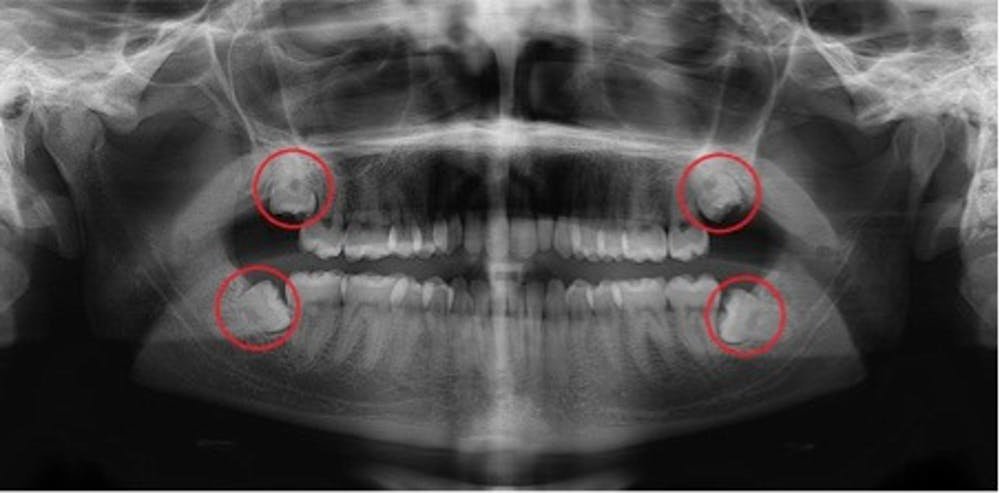At Dental Lifeline, we have developed procedures to remove teeth painlessly and an emphasis on saving as much of the supporting bone and gum tissues as possible. This is important because strong structures provide essential support for your implants, bridges, or dentures leading to the best possible functional and cosmetic results. We believe that every tooth is precious and one of the main goals of modern dentistry will always be the prevention of tooth loss because the loss of a single tooth can have a major impact upon your dental health and appearance.
Extracting teeth is made less difficult when the general principles of oral surgery are understood and practiced. If your dentist has recommended that a tooth be extracted, the following information will help you get through the first few days after your extraction. Should anything occur that seems out of the normal, do not hesitate to call your dentist.

The last teeth to develop and erupt into the jaws are called the third molars. Third molars usually erupt in the late teen years, which coincides with passage into adulthood and is referred to by some as the age of wisdom; hence “wisdom teeth”.
Wisdom teeth serve no useful function and will often cause damage because when a wisdom tooth becomes partially exposed through the gums it cannot be cleaned properly and can collect food debris, bacteria and plaque around itself. This can result in tooth decay, gum disease, infection and abscess of not only the wisdom teeth, of not only the wisdom teeth, but of the nearby molars and surrounding gum tissue. The molars in front of the wisdom teeth are sometimes lost because of cavities and gum disease caused by the inability to clean the wisdom teeth properly. Cyst formation and other destructive pathology are also seen around impacted wisdom teeth. There may be pain and swelling, or you may have no symptoms at all, even though the other teeth in your mouth may be at risk of damage.
After getting your wisdom teeth removed, you may experience some discomfort, bruising or swelling.
While your mouth heals, you have to be careful not to dislodge the blood clot or harm your healing gums. You should not consume hard foods, alcohol, coffee, soft drinks or hot beverages in the first day following your procedure. You shouldn’t even brush your teeth, especially around the extraction area for the first day of recovery.
There are plenty of things you can do to make the recovery time easier. Plan on taking it easy for a few days; you can resume your normal activities after the first day in most cases, but for about a week you don’t want to do anything that could dislodge the blood clot from where your teeth were removed. To help with the swelling, place an ice pack over your jaw. The cold helps to reduce the inflammation and ease any discomfort.
We will instruct you on how to take care of your mouth for the recovery period. You will be told to avoid brushing, spitting, flossing and rinsing for 24 hours. After that, you can gently brush your teeth.
After an extraction, you’ll be asked to bite on a piece of gauze for 20 to 30 minutes. This pressure will allow the blood to clot. You will still have a small amount of blood oozing for the next 24 hours or so. It should taper off after that. Don’t disturb the clot that forms on the wound. If heavy bleeding occurs bite down on a cotton pad for another 20 minutes and if it doesn’t stop contact us or go to hospital.
You can put ice packs on your face to reduce swelling. Typically, they are left on for 20 minutes at a time and removed for 20 minutes. If your jaw is sore and stiff after the swelling goes away, try warm compresses.
Eat soft and cool foods for a few days. Then try other food as you feel comfortable.
A gentle rinse with hot salt water, starting 24 hours after the surgery, can help to keep the area clean. Use one-half teaspoon of salt in a cup of water. Most bleeding ends within a day or two after the surgery. Swelling can last for a week. Initial healing takes at least two weeks.
If you need stitches, rinsing with hot salt water will help the stitches to stay clean. Some stitches need to be removed by the dentist.
You should not smoke, use a straw or spit after surgery. These actions can pull the blood clot out of the hole where the tooth was. Do not smoke on the day of surgery. Do not smoke for 24 to 72 hours after having a tooth extracted.
If you notice any unusual symptoms like pus discharge, severe pain or a fever, call us or go to hospital. While complications such as an infection are rare, they are possible.
A dry socket is very painful! So when it happens we might need to rinse out the empty socket, remove any debris and apply medicated dressings to protect the area and decrease the pain. Painkillers will help to reduce discomfort. With proper care and rest a dry socket should heal in 7 to 10 days.
Wisdom teeth removal if done by an experienced dental surgeon are relatively straight forward with minimal complications if any, so give us a call to get an expert in the field of dental surgery.
- No Gap (For Private Dental Health Insurance Patients)
- Not With Health Fund, Just pay $179
Shop 3, Ground Floor, 101-107 Oxford
street, Bondi Junction NSW 2022
Phone: 02 9387 3181
Fax: +61 93877570
Email: bondi@dentallifeline.com.au
178 Mann street Gosford 2250.
Phone: 02 4323 7007
Fax: +61 4323 7009
Email: gosford@dentallifeline.com.au
Shop 3/135 Pacific Highway Hornsby
Phone: 02 9476 0070
Email: hornsby@dentallifeline.com.au
106 Victoria Street, East Maitland.
Opening Soon…
Copyright © 2024 Dental Lifeline | All Rights Reserved.